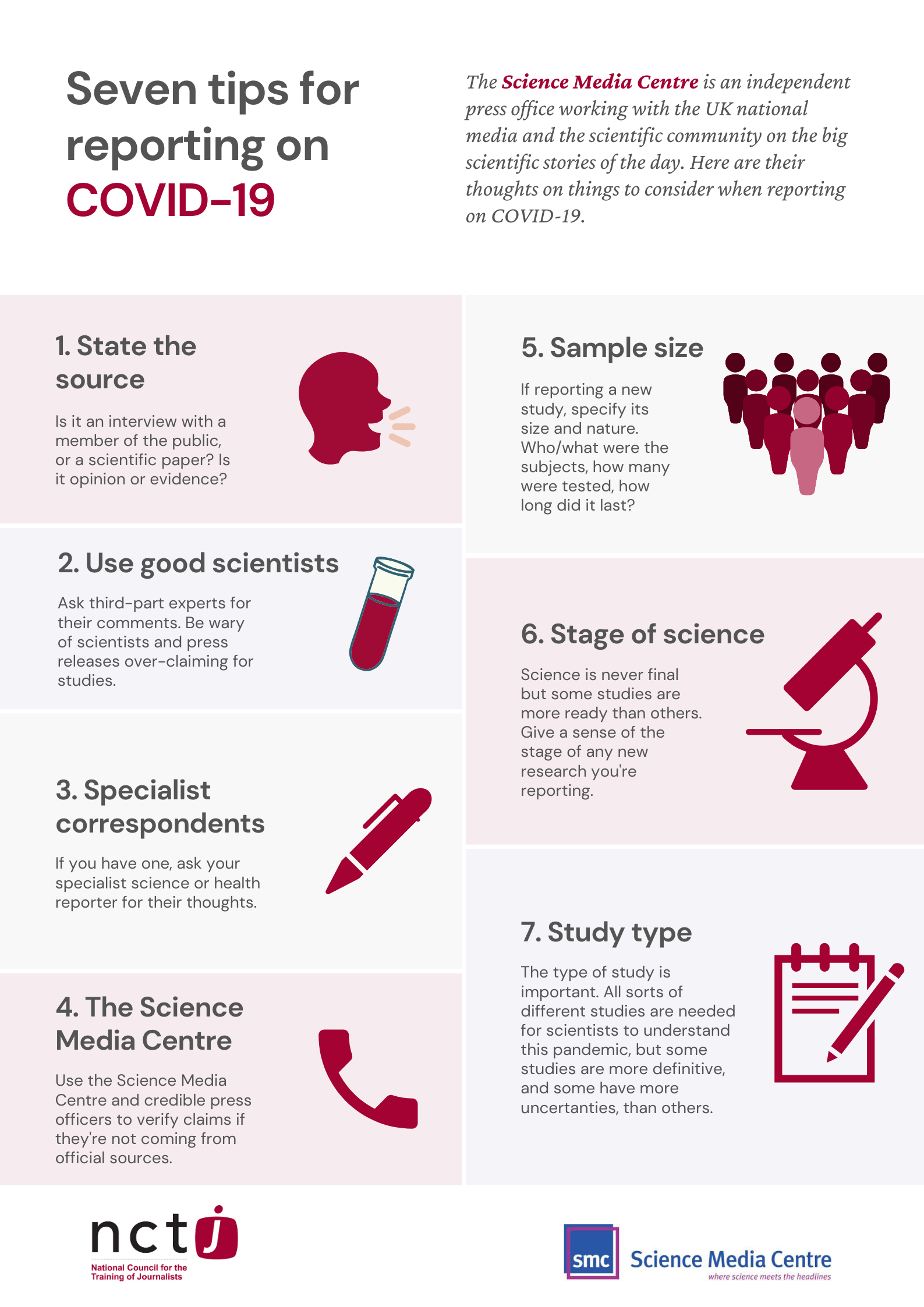Seven tips for journalists reporting on COVID-19 from the Science Media Centre
The Science Media Centre is an independent press office working with the UK national media and the scientific community on the big scientific stories of the day. Here are their thoughts on things to consider when you’re reporting on COVID-19.
The Science Media Centre is an independent press office working with the UK national media and the scientific community on the big scientific stories of the day. Here are their thoughts on things to consider when you’re reporting on COVID-19.
 1. State the source of the story. Is it an interview with a member of the public, official stats on case numbers, or a scientific journal paper; is it opinion or evidence – ideally with enough information for readers to look it up or a web link.
1. State the source of the story. Is it an interview with a member of the public, official stats on case numbers, or a scientific journal paper; is it opinion or evidence – ideally with enough information for readers to look it up or a web link.
2. Use good scientists. Ask third-party experts for their comments – in the fast-moving COVID-19 story try and get a sense of what the scientific community thinks about a specific new development or about how promising or otherwise a new study is. Be wary of scientists and press releases over-claiming for studies, and be wary of people who might not be experts making big claims. Scientists are usually experts in quite a narrow field so check their expertise.
3. Specialist correspondents. If you have one at your outlet, ask your specialist science or health reporter for their thoughts as they might have covered these sorts of stories before and will have an idea of reputable stories and scientists too.
4. The Science Media Centre. Use the Science Media Centre and credible press officers to verify claims if they’re not coming from official sources. We have a database of experts in various fields who see it as part of their job to help ensure COVID-19 is reported in an accurate, measured and proportionate way. Call us!
5. Sample size. If you’re reporting a new COVID-19 scientific study, specify its size and nature – e.g. who/what were the subjects, how many were tested, how long did it last, is it a randomised controlled trial in COVID-19 patients or an observational or animal study, or a theoretical modelling study? If space, mention the major limitations.
6. Stage of science. Give a sense of the stage of any new research you’re reporting – is this a preprint, a very early and preliminary set of data posted for other scientists to see but that hasn’t yet been through the normal checks and balances of peer review; or is it a full peer-reviewed paper being published in a scientific journal? Science is never final but some studies are more ready than others.
7. Study type. Distinguish between findings and interpretation or extrapolation – modelling studies are a key part of epidemic science but they are often based on assumptions rather than hard data; whereas e.g. genome mapping studies are based on hard data. The type of study is important. All sorts of different studies are needed for scientists to understand this pandemic, but some studies are more definitive, and some have more uncertainties, than others.
Here are some useful resources:
– Science Media Centre: https://www.sciencemediacentre.org/ (COVID-19 output at https://www.sciencemediacentre.org/tag/covid-19/)
– UK government advice on COVID-19: https://www.gov.uk/coronavirus
– UKRI Coronavirus, the science explained: https://coronavirusexplained.ukri.org/en/
– Full Fact coronavirus information: https://fullfact.org/health/coronavirus/
– World Health Organization: https://www.who.int/emergencies/diseases/novel-coronavirus-2019 and situation reports with official case numbers: https://www.who.int/emergencies/diseases/novel-coronavirus-2019/situation-reports/
– A source of global cases, deaths and numbers recovered, the John Hopkins case counter: https://gisanddata.maps.arcgis.com/apps/opsdashboard/index.html#/bda7594740fd40299423467b48e9ecf6
– Another source of global numbers, Worldometer: https://www.worldometers.info/coronavirus/

